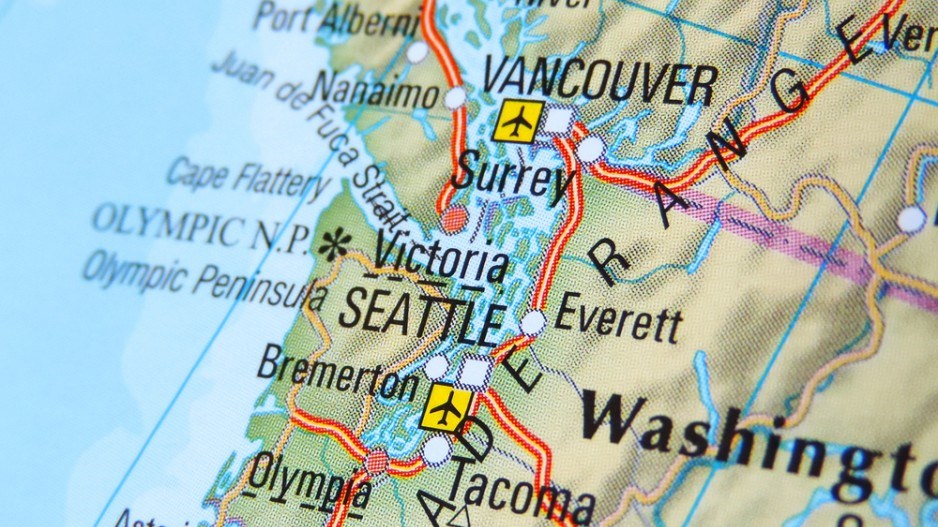It wouldn’t have been unusual a decade ago for a Seattle tech worker to think of Vancouver as little more than a stopping point along the way to Whistler’s ski hills, according to Bill Tam.
“The reality is the tech scene here in British Columbia has really come of age over the last five or six years,” the BC Tech Association (BCTA) CEO told Business in Vancouver on Roundhouse 98.3 FM.
Over that period, Seattle tech giants like Microsoft (Nasdaq:MSFT) and Amazon (Nasdaq:AMZN) have expanded their offices in Vancouver, along with growth-stage companies like Tableau.
The cities’ growing links proved to have enough potential that Microsoft gave the University of British Columbia and the University of Washington US$1 million to establish the Cascadia Urban Analytics Co-operative. The joint venture will see the universities collaborate on data science initiatives tackling urban challenges like traffic and homelessness.
Meanwhile, Tam’s organization is courting workers in Seattle to bolster B.C.’s tech talent pool.
The BCTA, along with a dozen local tech companies, travelled to Seattle in early May as part of its Go North Canada campaign aimed at luring Canadian expatriates in the tech sector to work in Vancouver.
The association’s partnership with Ontario-based Go North Canada gives it access to a database of about 25,000 candidates in the U.S. interested in opportunities in Canada.
The outreach to expats also comes just a month ahead of Ottawa’s planned rollout for its Global Skills Strategy, which aims to make it easier to bring in skilled foreign workers to boost growth at Canadian tech companies.
Finance Minister Bill Morneau announced initiatives last fall that include establishing a two-week standard to approve visas and 30-day work permits for skilled workers.
“The global skills program is really capitalizing on Canada’s position in the world, which has become a bit of a safe haven,” Tam said.
He added that there’s “no question” Seattle tech workers might be considering a move to Canada for reasons that are politically motivated following U.S. President Donald Trump’s inauguration.
Bruce Harwood, an immigration lawyer at Boughton Law, said the uncertainty Trump has created around the North American Free Trade Agreement’s future means more employers are reaching out to his firm to inquire about the status of the Canadian workers who immigrated to the U.S. based on provisions in the free trade agreement.
For non-Canadian skilled workers, Harwood said the Global Skills Strategy has the potential to meet employers’ needs, but a lack of updates since March has raised eyebrows.
With a month to go before the initiative’s June 12 rollout, the federal government has yet to release a list of occupations that would qualify under Global Skills.
An Employment and Social Development Canada spokeswoman told BIV in an email the department is still determining the final list of occupations but that it’s “expected to be available by June 12.”
The federal budget allocated $7.8 million this year toward the program, which an Immigration, Refugees and Citizenship Canada spokeswoman said is still on track to launch in June.
But Harwood said he’s skeptical employers would be able to use the program right out of the gate.
“If you have a company experiencing significant labour shortages, regardless of your sector, and HR in the company has been instructed to recruit, knowing that recruiting domestically is virtually impossible, how can you plan effectively for foreign recruitment with the pending changes to streamline the process when we don’t have a list of occupations?” he said.
“Let’s say they hold back the list until June 11: there will be a run of applications at the outset, all of which are to be processed within 10 business days.”




